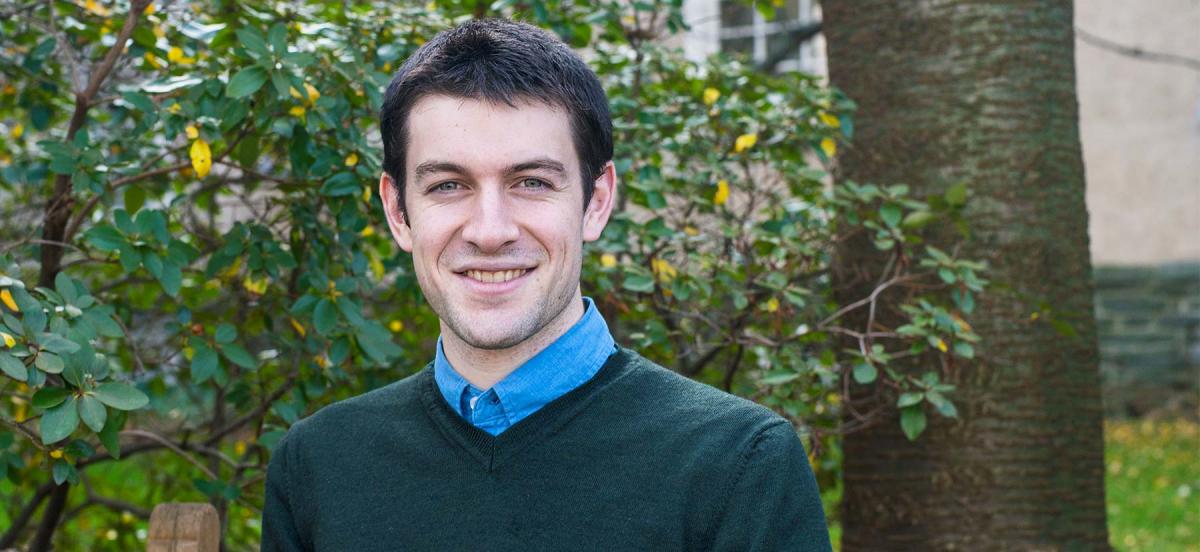Translating the Russian AIDS Crisis

George O'Hara '18. Photo by Patrick Montero.
Details
George O'Hara '18, a double major in Russian and chemistry, combined his interests by joining an epidemiological research project that resulted in a paper in PLOS Medicine's recent special issue on HIV/AIDS.
Many Haverford students have co-authored papers in scientific journals, but rarely can they credit their humanities studies for the feat. But George O'Hara can. The Russian and chemistry double major is a co-author of a recent PLOS Medicine paper on the HIV epidemic in the Russian Federation, for which his Russian language fluency was a key component.
The epidemiological paper mines recently published Russian National Surveillance data to show how severe the HIV/AIDS epidemic has become, particularly across six provinces in eastern and western Siberia, which had been previously unreported. And it concludes that the epidemic's continuous growth is a failure of public policy. But all of this analysis would have been impossible without O'Hara's translations of the Russian data, which was unavailable in English.
"George found the Russian data online, which colleagues had told me was available, but in Russian language only," says Johns Hopkins Desmond M. Tutu Professor of Public Health Dr. Chris Beyrer, the paper's lead author. "He then did original translations for us of all the data. He also learned how to use mapping software and generated the heat density maps, which display the data. He was invaluable."
O'Hara initially approached Beyrer about his work last spring, inspired to pursue epidemiological research opportunities following a summer spent studying abroad in St. Petersburg, Russia. It was there, while volunteering in an HIV clinical research laboratory at First Pavlov State Medical University of St. Petersburg, that O'Hara became interested in exploring the social and cultural dimensions of the country’s rapidly expanding HIV epidemic. Beyrer, in need of someone with Russian fluency to make the newly available data decipherable, invited him to join his international team. Together they collaborated with researchers from the Johns Hopkins University Bloomberg School of Public Health and the United Nations Special Envoy for HIV/AIDS in Eastern Europe and Central Asia in Geneva, Switzerland, over this past summer and fall.
"George had remarkably good translations skills in Russian, and was eager to take on challenges and learn new analytic tools," says Beyrer. "He performed at graduate levels of skill and with energy and commitment."
The resulting paper, "The Expanding Epidemic of HIV-1 in the Russian Federation," which is part of a recent special issue of PLOS Medicine devoted to advances in HIV and AIDS prevention and treatment, examines recent developments and persistent dynamics of the HIV epidemic in Russia, which is estimated to have the largest number of HIV-infected citizens in Europe and where, in contrast to the pattern worldwide, the virus is continuing to spread significantly.
"Our findings indicate that HIV spread in Russia is threatening to become uncontrollable as state-level inaction continues," says O'Hara. "Therein, this study underscores the urgency of implementing evidence-based intervention programs such as opioid agonist substitution therapy, needle and syringe exchanges, and tailored interventions for key at-risk groups such as injection drug users and sex workers. In this way, we advise applying our understanding of the high-risk behaviors contributing to the spread of HIV in order to control this deadly epidemic in the Russian Federation."
O'Hara is grateful to Beyrer for the opportunity to engage in his first epidemiological research and credits his Haverford liberal arts education—for which he has been able to pursue both Russian fluency and his interest in medicine as an application of chemistry—with preparing him for the project. In fact, he says it was neither language classes not science labs that most inspired him to try to better understand Russia's HIV epidemic; it was history classes.
"My interest in Russian culture and history that has led me to pursue this research has been nurtured by the education that I have received from Professor of History Linda Gerstein at Haverford through her courses in 19th- and 20th-century Russian history," said O'Hara, whose forthcoming Russian thesis focuses on drug and alcohol abuse in a series of recent Russian films. "Professor Gerstein’s approach to Russian studies has challenged me to develop a more nuanced understanding of the cultural conflicts between tradition and modernity that have persisted throughout Russian history and into the present day. From this understanding I decided to apply my language ability to characterize and quantify the impact of this increasingly severe HIV epidemic on a country and culture that have long fascinated me."



